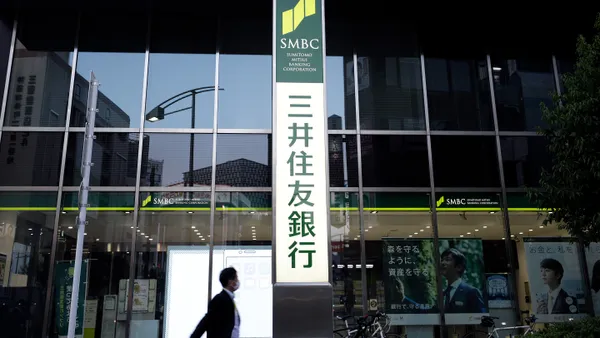Dive Brief:
- Nearly 60% of the world's banks may not be economically viable ahead of the next downturn because their returns of equity aren’t keeping pace with costs, an annual review from consultant McKinsey & Co. indicated Monday.
- Banks must innovate or risk "becoming footnotes to history" because fintechs are changing customer behavior, and looser regulations are giving them easier entrance to the market, the report said.
- Banks’ valuations have dropped 15% to 20% since the start of 2018, McKinsey said, suggesting "investors anticipate a sharp deceleration in earnings growth."
Dive Insight:
Fintechs allocate double the share of their information technology budgets to innovation as do banks — 70% versus 35%, McKinsey said.
The report divides banks into four categories and has specific recommendations for each:
- Market leaders — the 20% of global banks that capture nearly 100% of the industry’s economic value added — should reinvest their capital in innovation and further scale.
- Resilients — the 25% of banks, including many in Europe, that have maintained leadership in challenging markets — should focus on expanding their customer base and product offerings and differentiate through innovation.
- Followers — the 20% of banks that are weaker than their peers — should act quickly to achieve scale, shift their business models or radically cut costs.
- Challenged banks — the 35% that are both sub-scale and in unfavorable markets — should look to merge with similar banks or find a stronger buyer.
Most recent attempts by banks to ramp up efficiency have been "business-as-usual," the report said, but the time for staying the course may be ending.
"We believe we're in the late economic cycle and banks need to make bold moves now because they are not in great shape," Kausik Rajgopal, a senior partner at McKinsey, told Bloomberg. "In the late cycle, nobody can afford to rest on their laurels."
The report cites Amazon as an example of a technology company that's edging into financial services by taking on a generally high-return segment of banks' business: credit cards.
Banks "need to get much more comfortable with external partnerships," Rajgopal said.
Lenders can scrounge up extra funds for technology by outsourcing "non-differentiating activities," such as some trading and compliance functions, McKinsey said.
To be sure, the gap in return on equity appears more severe in developing markets. "Emerging market banks have seen [return on tangible equity] decline steeply, from 20 percent in 2013 to 14.1 percent in 2018, due largely to digital disruption that continues unabated," the report said. Comparatively, return on tangible equity in developed markets has risen from 6.8% to 8.9% in that same time frame.
But the threat from technology remains. "Going forward, scale will likely matter even more as banks head into an arms race on technology," the report said.











